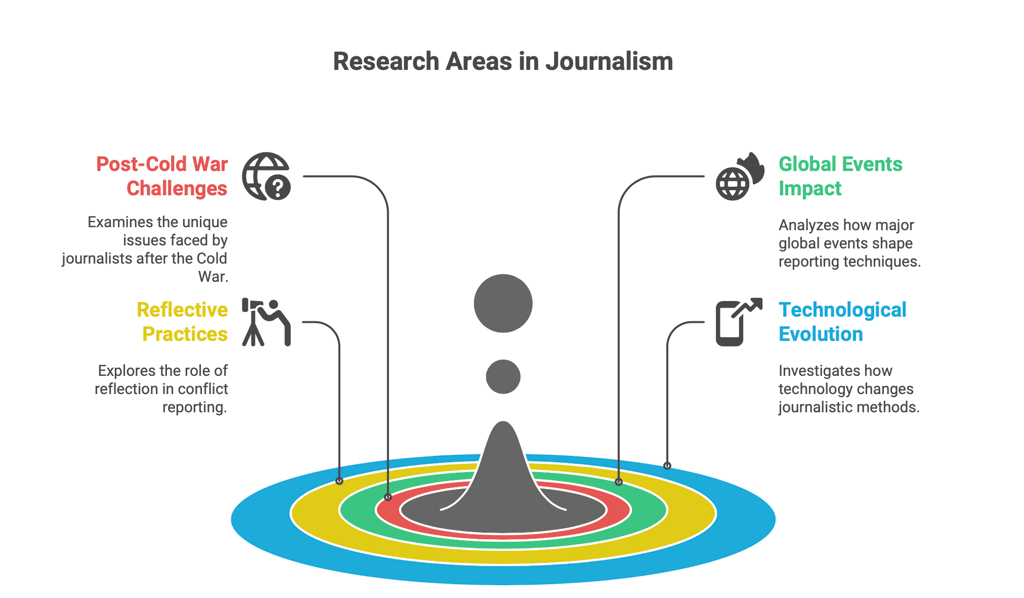Reflective Journalism: Principles, Applications, and Academic Foundations
Explore reflective journalism's core principles, practical applications, and academic foundations. Learn how self-awareness and critical thinking enhance reporting quality and build public trust.
INDRA KUMAR
5/12/20255 min read


Reflective journalism represents an evolving approach to journalistic practice that emphasizes self-awareness and critical thinking throughout the reporting process. Unlike traditional journalism that focuses primarily on external events, reflective journalism encourages reporters to examine their own biases and assumptions while covering stories. This methodology has gained significant recognition in both academic and professional circles as media organizations seek to rebuild public trust and enhance reporting quality.
At its core, reflective journalism is a practice where journalists not only report events but also engage in systematic reflection about their role, biases, and the broader societal impact of their work. This approach transforms the journalist from a mere observer to an active participant who acknowledges their influence on the narrative they create.
The Theoretical Foundation of Reflective Journalism
Self-Awareness and Critical Evaluation
Reflective journalism is built upon several key theoretical principles that guide its practice. The first and perhaps most fundamental is a self-awareness – the continuous examination of personal biases, assumptions, and perspectives that inevitably influence reporting. This self-awareness extends to critical evaluation, where journalists regularly assess their reporting choices and consider the implications of these decisions.
Understanding what is a reflection in writing is essential for journalists seeking to improve their craft. In the journalistic context, reflection involves deliberately analyzing one's reporting process, from story selection and source relationships to framing and language choices. This analysis goes beyond simple introspection to include consideration of how these choices affect the final product and its impact on audiences.
Adaptive Practice and Ethical Consideration
Another cornerstone of reflective journalism is adaptive practice – the willingness to adjust approaches based on reflection and feedback. This flexibility allows journalists to evolve their methods in response to changing circumstances, new information, or recognized shortcomings in previous work.
Ethical consideration forms the final pillar of reflective journalism's theoretical foundation. By maintaining a focus on journalistic integrity and accountability, reflective journalists continuously evaluate the ethical implications of their reporting decisions. This process helps prevent ethical lapses and builds a stronger foundation for responsible journalism.
University of London's Contributions to Reflective Journalism Research
The University of London, particularly through London Metropolitan University, has made significant contributions to the field of reflective journalism. A notable doctoral thesis by James Rodgers examines reflective journalistic practice in uncertain environments, providing valuable insights into how journalists can maintain ethical standards and professional integrity in challenging situations.


The practice of reflective journalism has gained recognition in academic and professional circles, with institutions like the University of London leading research efforts to formalize and enhance its methodologies. Their work has helped establish reflective journalism as a distinct approach with measurable benefits for both journalists and their audiences.
Applications of Reflective Journalism in Modern Media
Professional Implementation
Reflective journalism techniques have found practical applications across various media organizations. News outlets implementing reflective practices often report improved accuracy, more nuanced coverage, and stronger audience connections. The systematic documentation of the journalistic process allows for better quality control and more transparent reporting.
Many news organizations now encourage reflective journal writing among their staff, particularly those covering traumatic events or complex social issues. This practice helps reporters process their experiences while improving their awareness of how personal reactions might influence their reporting.
Educational Implementation
Reflection writing helps journalists process complex emotions after covering traumatic events. This therapeutic aspect of reflective journalism has made it an essential component of journalism education, where students learn to balance professional objectivity with human responses to difficult situations.
The educational implementation of reflective journalism serves multiple purposes:
Decision-making — Enhances analytical skills — Improved professional judgment
Course Integration — Connects theory with practice — Deeper understanding of concepts
Professional Development — Builds self-awareness — Enhanced career growth
Peer Learning — Facilitates knowledge sharing — Collaborative skill development
Journalism students frequently write what is a reflective essay as part of their coursework. These assignments help develop critical thinking skills while encouraging students to connect theoretical knowledge with practical experiences. Learning what is a reflective essay helps journalists document their professional growth and identify areas for improvement.
Digital Applications of Reflective Journalism
The digital revolution has transformed how reflective journalism is practiced and shared. Online platforms provide new opportunities for journalists to engage in reflection and share their insights with colleagues and audiences.
Blogging and Digital Platforms
Many journalists maintain professional blogs where they analyze their reporting processes, discuss ethical dilemmas, and share lessons learned. These digital spaces serve as both personal reflection tools and professional development resources for the broader journalistic community.
A recent case study revealed several benefits of digital reflective practice:
Daily Reflection: Digital platforms facilitate regular reflective practice through accessible, easy to-use tools
Peer Interaction: Online spaces enable collaborative learning and feedback from colleagues worldwide
Professional Identity: Digital reflection aids in developing a distinct professional persona and voice
Community Building: Creates supportive networks for journalists facing similar challenges
Studying reflective writing examples from experienced journalists can accelerate professional development. These examples, often shared through digital platforms, demonstrate how effective self-analysis can improve reporting quality and ethical decision-making.
Practical Implementation Guidelines for Reflective Journalism
Structured Reflection Process
Implementing reflective journalism requires a structured approach that balances spontaneous insight with methodical analysis. The practical application involves specific methodologies:
Integration of Theory and Practice: Connecting academic knowledge with real-world reporting situations
Systematic Documentation: Maintaining detailed records of reporting decisions and their rationales
Evidence-based Reflection: Using concrete examples rather than vague impressions
Outcome Assessment: Evaluating the impact of reflective practices on reporting quality
The best reflective writing examples combine personal insight with professional standards. These examples demonstrate how journalists can maintain objectivity while acknowledging their subjective experiences and perspectives.
Tools and Techniques
Several tools and techniques can enhance reflective journalism practice:
Reflective Journals: Regular documentation of experiences, decisions, and lessons learned
Peer Discussion Groups: Collaborative reflection with colleagues facing similar challenges
Structured Frameworks: Using established models to guide reflection
Mentorship Programs: Learning from experienced practitioners of reflective journalism
When we define reflective journalism, we emphasize both self-awareness and critical thinking. These complementary skills allow journalists to examine their work from multiple perspectives, identifying both strengths and areas for improvement.
The Impact and Benefits of Reflective Journalism
Research-Backed Benefits
The academic community has documented several key impacts of reflective journalism:
Impact Area Findings
Public Trust — Enhanced credibility and audience connection Smith (2022)
Educational Outcomes — Improved critical thinking and ethical decision-making Lee and Patel (2023)
Professional Practice — More nuanced and responsible reporting Thompson (2023)
A well-written journalism reflective essay examines both successes and failures in reporting. This balanced approach helps journalists develop resilience while continuously improving their craft.
Personal and Professional Growth
Beyond organizational benefits, reflective journalism offers significant advantages for individual journalists
Enhanced self-awareness and emotional intelligence
Improved ability to navigate complex ethical situations
Greater resilience when covering traumatic events
More effective relationship-building with sources and communities
Clearer professional identity and purpose
The journalism reflective essay has become a standard assignment in media education because it effectively develops these crucial professional skills.
Conclusion: The Future of Reflective Journalism
Reflective journalism continues to evolve as both an academic discipline and professional practice. Research indicates several emerging trends:
Integration with Digital Technologies: New tools for documentation and analysis
Enhanced Focus on Ethical Considerations: Particularly in an era of misinformation
Development of Standardized Reflective Practices: Creating industry benchmarks
Increased Emphasis on Audience Engagement: Using reflection to better understand and serve communities
As media organizations face increasing scrutiny and declining public trust, reflective journalism offers a pathway to more responsible, transparent, and effective reporting. By embracing self-awareness, critical evaluation, and ethical consideration, journalists can enhance both the quality of their work and its impact on society.
The practice of reflective journalism has gained recognition in academic and professional circles as a valuable approach to addressing journalism's contemporary challenges. As research continues to demonstrate its benefits, we can expect to see wider adoption across media organizations and educational institutions worldwide.